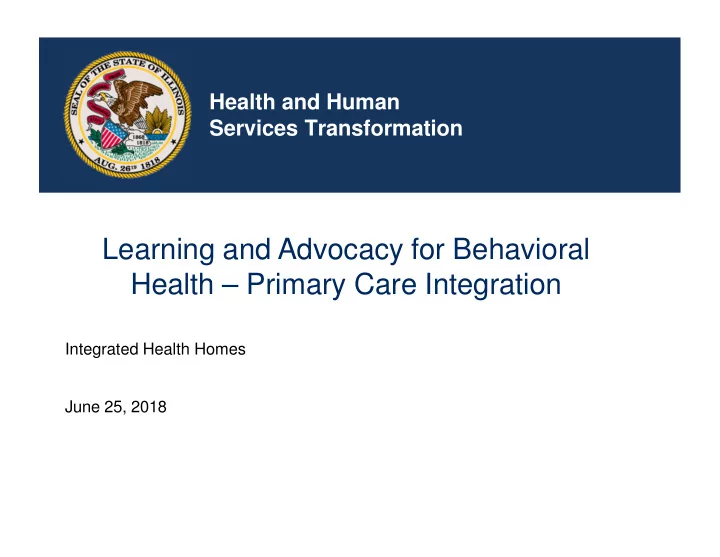

Health and Human Services Transformation Learning and Advocacy for Behavioral Health – Primary Care Integration Integrated Health Homes June 25, 2018
INTEGRATED HEALTH HOMES DRAFT Confidential – Proprietary and Pre-decisional 2
What an Integrated Health Home is and is not Integrated Health Homes in Illinois Integrated Health Homes in Illinois are: are NOT: … and NOT on the provision of all services Primary focus is on coordination of care… � Provider of all services for members � Integrated, individualized care planning and � A gatekeeper restricting a member’s choice of coordination resources, spanning physical, behavioral and social care needs providers � An opportunity to promote quality in the core � A physical place where all Integrated Health provision of physical and behavioral health care Home activities occur � A way to encourage team-based care � A care coordination approach that is the delivered in a member-centric way same for all members regardless of individual � A way of aligning financial incentives around needs evidence-informed practices, wellness promotion, and health outcomes For members with the highest needs: � A means of facilitating high intensity, wraparound care coordination � An opportunity to obtain enhanced match for care coordination needs � Identifying enhanced support to help these members and their families manage complex needs (e.g., housing, justice system) DRAFT Confidential – Proprietary and Pre-decisional 3
Profiles of ACA Health Homes launched to date Illinois would be the first fully integrated Health Home Includes members withSMI/SEDs 1 Largest Medicaid Health Home programs developed as of February 2017 Number of enrollees, thousands % of Medicaid Conditions population addressed � Chronic 540 26% � Chronic/SMI 230 26% � Chronic/SMI 220 3% � Chronic 4% 69 � SMI 60 4% � Chronic 52 2 19% � SMI/SED 25 2 4% � SMI/SED 25 2 3% Many states also employ Patient-Centered Medical Home programs to coordinate the physical health needs of their members separately, but Illinois model would coordinate both physical and behavioral health care for all ~3.1m Medicaid members 1 Only includes members who are part of the state’s largest Health Home program 2 SMI = Serious M e n a t l I l l n e s s ; S E D = S e r i o u s E m o t i o n a l D s i t u r b a n c e D R A F T C o n f i d e n t i a l – P r o p r i e t a r y a n d P r e - 4 SOURCE: CMS Health HomeIRC d e c i s i o n a l
Principles for developing care delivery model Develop a person- and family-centered care delivery model for the whole Medicaid population, regardless of match status, that encourages member and family engagement Evolve toward full clinical integration of behavioral, physical, and social healthcare Craft a flexible care delivery approach that reflects the diverse needs of members in Illinois and recognizes that member needs change over time Acknowledge and accommodate geographical variation in provider capabilities, readiness, and priorities Strike an appropriate balance between provider flexibility and accountability to enable capabilities and readiness Prioritize economic sustainability of care delivery model at both the systemic and provider levels DRAFT Confidential – Proprietary and Pre-decisional 5
A Overview of potential approach to IHH member stratification ILLUSTRATIVE High High- High behavioral health needs, est Low physical health needs needs Level of behav- ioral Low Moderate health behavioral needs needs health needs, members high physical health needs Low needs members Low Low High Level of physical health needs � Full Medicaid population will be included in the model, with exception of those receiving duplicative care coordination, in LTC facilities after 90 days, or with MMAI dual, partial eligibile, or TPL status � Approach to tiering adopted to ensure members with similar needs receive comparable care coordination support, and to focus resources on those members who need greatest support DRAFT Confidential – Proprietary and Pre-decisional 6
Integrated Health Home Implementation and Next Steps Reimbursed through a per-member, per-month (PMPM) case management fee Model includes outcomes-based payment model rewarding measurable, positive outcomes associated with integrated care Developed in consultation with input and feedback from the HFS Medicaid Waiver Advisory Committee and sister state agencies HFS will continue collaboration with interested parties through learning collaboratives, provider forums and in-person meetings Anticipated Effective Date for Integrated Health Homes is October 1, 2018 Questions? DRAFT Confidential – Proprietary and Pre-decisional 7
Recommend
More recommend